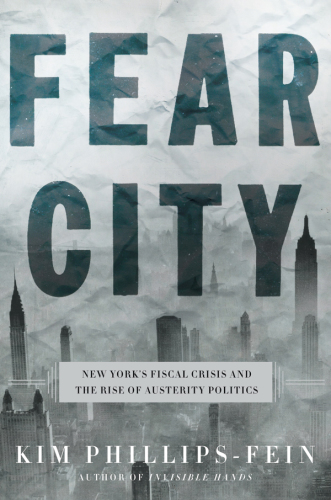
Fear City
New York's Fiscal Crisis and the Rise of Austerity Politics
فرمت کتاب
ebook
تاریخ انتشار
2017
نویسنده
Kim Phillips-Feinناشر
Henry Holt and Co.شابک
9780805095265
کتاب های مرتبط
- اطلاعات
- نقد و بررسی
- دیدگاه کاربران
نقد و بررسی

Starred review from March 6, 2017
Phillips-Fein (Invisible Hands), professor of history at NYU’s Gallatin School of Individualized Study, makes municipal bonds exciting in this painstakingly researched revisionist account of the 1970s fiscal crisis that shook New York to its core. She argues that, although the city would go on to emerge from the crisis seemingly unscathed, its robust brand of social democratic politics would be lost forever. Paced like a thriller and extremely well written, the book chronicles the slow descent of the city into a fiscal abyss and its unlikely rescue by a group of hardened bureaucrats, altruistic investment bankers, and political power players who formed the Municipal Assistance Corporation. Dubbed “Big MAC,” the committee succeeded in passing austerity measures that gutted the city’s public services and institutions while restoring fiscal health—but at the cost of reorienting city politics towards the wealthy and paving the way for the glittering, profoundly unequal “hard-edged city” of today. Phillips-Fein narrates with almost cinematic flair, and by the time the credits roll, the significance of her accomplishment becomes clear. The book should be required reading for all those interested in the past, present, and future of democratic politics.

Starred review from February 15, 2017
New York may be an amusement park for the very rich these days, but as this grimly detailed historical account reveals, there was a time...."Ford to City: Drop Dead." The New York Daily News headline of Oct. 30, 1975, still resounds. It wouldn't be long before Ford gave way to Carter and the Summer of Sam, but the president's shock-doctrine belief that the U.S. had entered "an age of austerity, in which it was no longer possible for the government to pay for many social services to which the American people had grown accustomed," has also remained constant in the years since. Phillips-Fein (History/NYU Gallatin School of Individualized Study; Invisible Hands: The Making of the Conservative Movement from the New Deal to Reagan, 2009, etc.) deftly recounts the clash between government entities and vested interests as New York struggled to cope with slashed social service budgets, funding that contributed to what economists call public goods of use to society at large but that was frowned on by the dawning every-man-for-himself conservative movement that has since held sway. Those austerity budgets soon threatened to bring the city to the edge of bankruptcy, which was itself a shock doctrine all its own--for, as Phillips-Fein writes, "the financial collapse of New York would be the ultimate symbol of American economic decline, a demonstration to the whole world that the United States was no longer the preeminent nation it had been over the postwar years." Given events since, New York's crisis--and the author's astute account of it--seems oddly timely, a swirl of "crisis budgets" and union-busting, of collapsing public education systems and declining labor power. In the end, she writes, as New York went in the '70s and beyond, so went the nation, from a time when government held public goods to be of value to one in which private enterprise is the "sole way to fuel social development"--perfectly consonant, that is to say, with an economy and culture of inequality. Sobering, smart reading with many pointed lessons for activists.
COPYRIGHT(2017) Kirkus Reviews, ALL RIGHTS RESERVED.

April 15, 2017
President Gerald Ford's reaction to New York City's fiscal crisis in the 1970s was encapsulated by the classic Daily News headline: Ford to City: Drop Dead. This analysis of the city's precipitous slide toward bankruptcy focuses on the unique mix of Wall Street's financial power and New York's liberalism, factors that combined both to drive debt ever higher and to alienate great swaths of the country. Phillips-Fein, a professor of history at NYU, isolates the cost of vastly increased public services and the devices (mainly loans) used by multiple mayors (Robert Wagner, John Lindsay, even Abe Beame) to extricate the city from massive debt as being the keys to the economic drama. Austerity efforts did not solve the problems by themselves, nor, as the author points out, did the banks or the labor unions. The author is to be commended for turning a very complex economic subject into a readable text and for giving space to the many citizens affected by the cutbacks. Still, this book offers a grim reminder of what happens when shortsightedness from left and right drive public policy.(Reprinted with permission of Booklist, copyright 2017, American Library Association.)

























دیدگاه کاربران